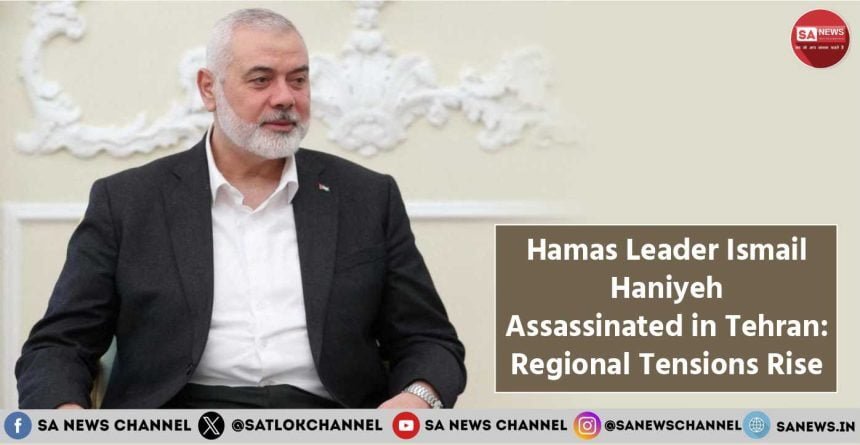Hamas Leader Ismail Haniyeh Killed in Tehran: In a shocking event, Hamas political leader Ismail Haniyeh was killed in Tehran, escalating the Israel-Palestine conflict. Learn about his life, assassination, and international reactions.
- Key Points about Hamas Leader Ismail Haniyeh Assassinated
- Early Life and Education
- Political Career
- The Assassination: What We Know So Far
- Response of Hamas
- Israel’s Position
- Impact on Hamas
- Recent Developments
- Looking Ahead: Uncertainties and Possibilities
- Life’s Precious Gift: Embracing the Divine Path
- Connect With Us on the Following Social Media Platforms
Key Points about Hamas Leader Ismail Haniyeh Assassinated
- Ismail Haniyeh, political chief of Hamas, was assassinated in Tehran, Iran
- Killed in an Israeli airstrike targeting his residence
- Attended Iran’s new president inauguration before his death
- Tensions escalated in the region following his assassination
- Born in 1962 in the Al-Shati refugee camp in Gaza
- Known for his opposition to Israel and efforts for the Palestinian cause
- Death deals a significant blow to Hamas
- Uncertainty surrounds the future of the organization
- Risk of further violence looming large
- Geopolitical ramifications could reshape the region
In a shocking development that shook the entire Middle East early Wednesday, Hamas political leader Ismail Haniyeh was killed in Tehran, Iran. The unexpected situation has led to an escalation in the conflict between Israel and Palestinian armed groups.
Early Life and Education
Haniyeh, aged 62, had a long history with Hamas, joining the group during its formation in 1987. His journey from a student activist to the top leadership of Hamas is a story of dedication and perseverance.
- Born to refugee parents in the village of Al Jura, near Ashkelon
- Studied at the Islamic University in Gaza City
- Joined Hamas during the first Palestinian uprising in 1987
■ Also Read: Who won World War 2 and Who Lost?
Political Career
- Became a devoted supporter of Hamas founder Sheikh Ahmed Yassin
- Commented on Hamas’ entry into Israeli politics as early as 1994
- Elected as the first Prime Minister of Palestine in 2006
- Deposed by President Mahmoud Abbas in 2007, but still governed Gaza
- Elected Leader of the Hamas Politburo in 2017
The Assassination: What We Know So Far
According to Hamas, Haniyeh was killed in what they labeled a “treacherous Zionist raid” on his residence in Tehran. The incident came shortly after Haniyeh attended a meeting with Iran’s new president, whose name is incorrectly stated as Masoud Pezeshkian.
- Murdered in Tehran, Iran
- Iran’s revolutionaries are monitoring the incident
- No group has claimed responsibility for the attack
- Israel has yet to respond to the allegations
Response of Hamas
The news of Haniyeh’s death sparked an immediate outcry, raising questions about its impact on regional security. Hamas expressed sorrow over Haniyeh’s death, describing him as a “martyr” and vowing to continue their fight. The group referenced religious beliefs, citing verses in the Quran about martyrdom.
■ Also Read: Assassination of Hamas Political Chief Ismail Haniyeh in Iran
Israel’s Position
While Israel has not responded to the allegations, it has a known history of targeting Hamas leaders. Israel assassinated Hamas leader Ahmed Yassin and co-founder Abdulaziz al Rantisi in Gaza in 2004.
Impact on Hamas
Analysts believe that although Haniyeh’s death poses a significant challenge for Hamas, the group has historically survived the assassination of its leaders. Haniyeh’s lack of direct military involvement in Gaza could limit the immediate operational impact on Hamas.
Recent Developments
- In April, Haniyeh announced that 60 of his relatives, including three of his sons and two of his grandsons, had been killed in Israeli airstrikes on Gaza.
- Hours before Haniyeh’s death, Israel claimed that Fouad, a senior Hezbollah military commander, had been killed in an airstrike south of Beirut.
- These events follow Hamas’ offensive against southern Israel in October, leading to the current heightened conflict.
Looking Ahead: Uncertainties and Possibilities
As the world digests this shocking news, several questions remain unanswered:
- How will Hamas respond to the loss of its political leader?
- What impact will this have on the ongoing conflict in Gaza?
- Will this assassination lead to further escalation in the region?
Life’s Precious Gift: Embracing the Divine Path
In light of Ismail Haniyeh’s sudden passing, we’re reminded of the fragility of human life. None of us knows what the next moment holds, which can be unsettling but also offers a powerful lesson. Instead of living in fear, we can find comfort and purpose in devotion to God. Sacred books like “Gyan Ganga” and “Way of Living” by Saint Rampal Ji Maharaj teach us to make the most of our precious time on Earth, emphasizing that true peace comes from within through spiritual connection. By turning to faith and living with kindness, we can find meaning in every moment, no matter how uncertain the future may be. Let’s cherish this gift of life and use it wisely.









